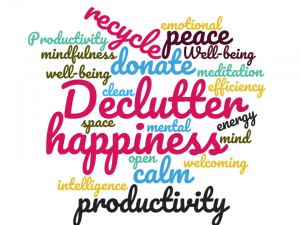
Another year is over. But chances are, your clutter isn’t.
It’s time to declutter before starting another year (and another decade). Studies show that being organized reduces stress and increases efficiency. The co-author of Emotional Intelligence 2.0 cites the following facts about productivity:
- The average office employee spends over one hour each day just looking for things.
- The average U.S. executive spends six weeks per year searching through messy desks and disorganized files for misplaced information.
- 23% of adults say they’re late paying their bills because they lose them
In these cases, clutter is the enemy of productivity. Being efficient starts with decluttering.
Where to start? Pick an area of your choice and dive in. Then move on to another area.
Declutter Your Office (or Work Space)

What does your work space look like? Take note if it’s messy or disorganized. Decluttering the area will help you focus on your goals. Clutter distracts.
Whenever my job required my office to shift to a new building or location, I filled dumpsters with unnecessary stuff to simplify the move. While I had occasional remorse if I looked for something I had eliminated, it was far more common I found what I needed faster. I realized we don’t need to relocate to declutter.
Start by removing everything possible from your work area. If you have a desk, move it. The effort enables you to do a deep-clean. Vacuum. Dust. Disinfect, if appropriate. Create some open space and leave it that way. THEN…
Be conscious about what you put back. Keep items you use daily within arm’s reach. Do you REALLY need to use them every day? Purge documents and folders (both physical and electronic) and other items that are no longer necessary. Organize other things out of sight.
Don’t allow your desk drawer to become a catch-all. Make a habit of removing junk.
Trim down your virtual desktop. Look for opportunities to move to paperless systems to reduce clutter and increase searchability.
Commit to regular decluttering. You will be less stressed and more productive.
Declutter Your Home
Most people are now familiar with Marie Kondo’s book, The Life-Changing Magic of Tidying Up, or her Netflix show, Tidying Up With Marie Kondo. Both encourage people to take a holistic approach to reducing excess material trappings by determining which ones you value and appreciate. It moves you away from basic organization toward minimalism. I chuckled when I read one Amazon reviewer’s comment: “I always thought I was a very organized person (because everything I owned had a designated, labelled place and my house was always super clean), but after reading this book I realized I was nothing more than a skilled hoarder.” I suspect many of us are skilled (or unskilled) hoarders.
Kondo’s recommendation is to declutter by category, and do it in a marathon session, acknowledging it could take weeks (or months). Other experts, like “The Minimalist Home” author Joshua Becker, focus on the benefits of owning fewer things. There is less to organize and less to clean. And the approaches to minimalism offer more flexibility to start small.

Evaluate your possessions and put them into one of four categories: trash, keep, donate, recycle. Do this with every closet, every room, every hidden storage cubby. Even the garage, attic, and basement. Clothes, momentos, pictures, medicines, electronics, food, cleaning supplies, tools, appliances—in short, all things—are fair game.
You might start with five minutes or an entire weekend. Maybe you fill one trash bag, or commit to eliminating one item per day every day. Decide what will motivate you to pursue the process to the end. Remain firm. If you have occasional indecision about an item, set it aside and keep going. Just don’t allow your pile of undecided items to grow too large.
In all honesty, I can’t think of an easy way to declutter years of accumulations. It requires some personal tenacity. But the final results are worth it.
Declutter Your Mind and Your Life
Perhaps even worse than a cluttered home is a cluttered mind. Disorganized. Unfocused. Restless. Foggy. Our chatty inner voices bombard our minds with unnecessary and extraneous thoughts.

Many of us spend too much time dwelling on the past or brooding about the future, risking damage to our well-being. We have trouble sleeping because thoughts nag at us. It happened to me last night. My brain harassed me about an unfinished project. I eventually convinced myself I could be more efficient after a good night’s sleep, but that required mental discipline. I put my brain into meditation mode, forcing most of the negative thoughts away.
If you’ve already decluttered your home and work space, you have already reduced some pressure on mental clutter. But you’re not done.
Cyberspace has elevated the mental clutter we all experience. Social media, email, texts, and incessant apps suck the energy out of our mental flows. Think about it. How much time do you spend tech-free? Extricate yourself from negative social media. Tune in to only those that contribute to the quality of your life or knowledge.
Prioritize your relationships. Which ones enhance your life? Which ones are toxic? Be objective and honest. Strong, positive relationships calm your mind, while others introduce clutter.
Collect all your thoughts and decide what to trash and what to keep. Throw away emotions and thoughts that no longer serve you. Savor the ones that do.
Declutter regularly. Set yourself free from physical and emotional baggage that is weighing you down. Focus on the essential to bring more peace and happiness into your life.
